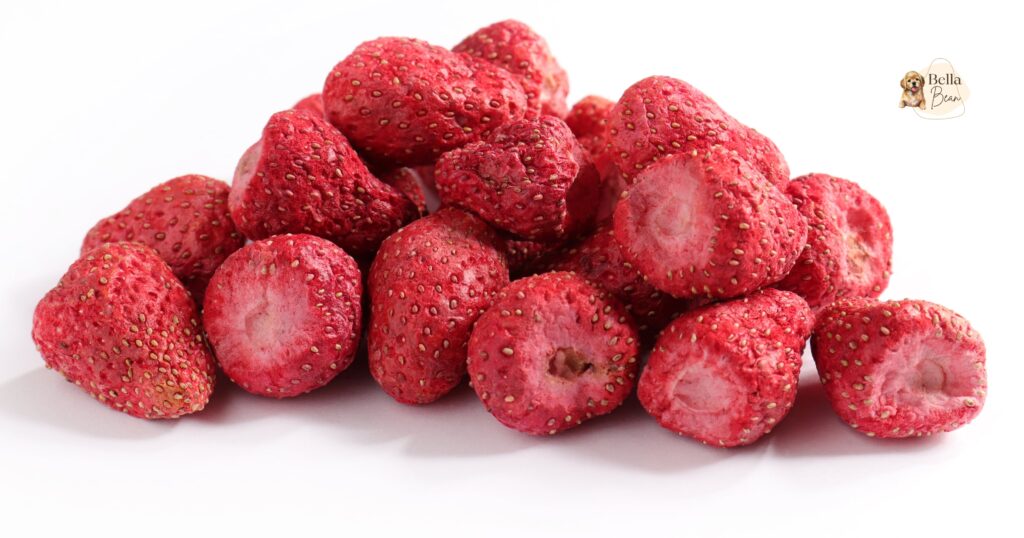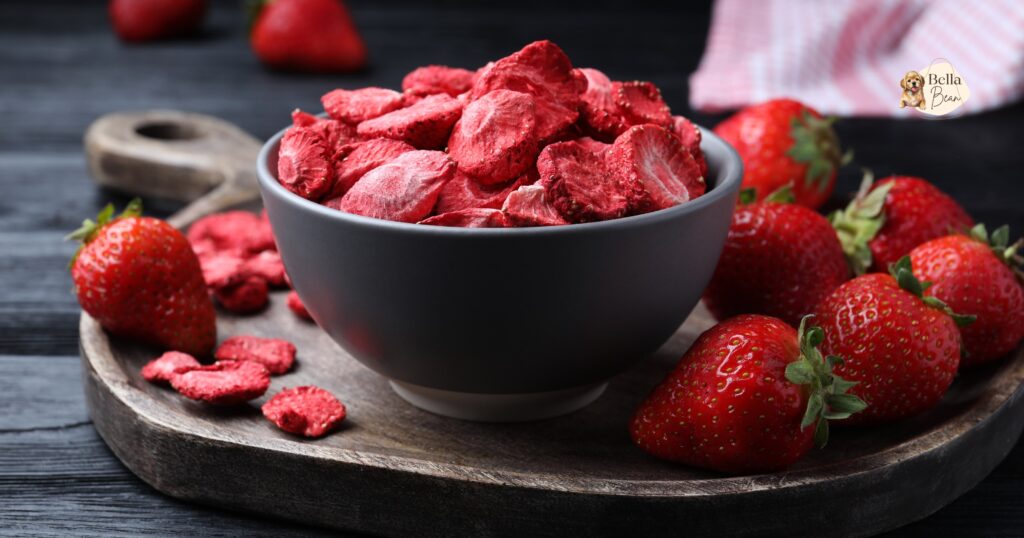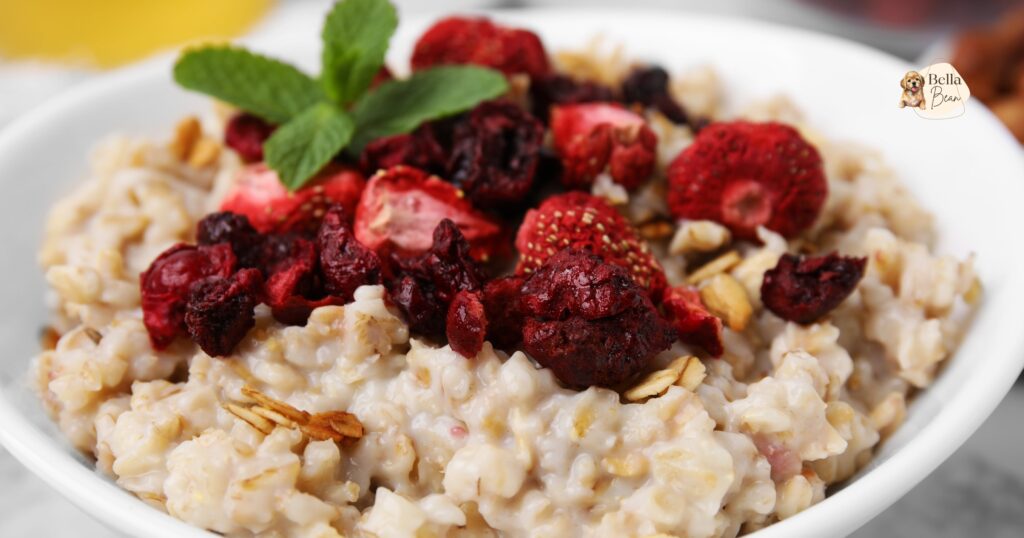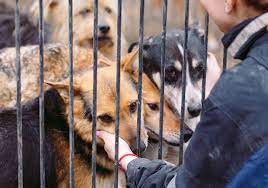Can Dogs Have Freeze Dried Strawberries? If you need to opt for something other than raw strawberries for your pet, go for frozen or dehydrated ones. Keep in mind that dried strawberries are concentrated, so it’s best to offer your furry friend small portions at a time.
Dogs are known for their love of food and can’t help but beg for human snacks. One popular snack that humans often consume is freeze-dried strawberries. However, as a responsible dog owner, you may be wondering if it’s safe to share this treat with your furry friend.
In this article, we’ll explore whether it’s safe for dogs to eat freeze-dried strawberries and what precautions you should take.

Table of Contents
ToggleAre Freeze Dried Strawberries Safe for Dogs?
Freeze-dried strawberries are fresh strawberries that have been frozen and then dehydrated.
This process removes all the moisture from the fruit, leaving a crunchy and nutrient-dense snack.
While freeze-dried strawberries may seem like a healthy treat, they can potentially pose some risks to dogs.
The main concern with feeding freeze-dried strawberries to dogs is the potential choking hazard.
Due to their crunchy and dry texture, these treats can get stuck in a dog’s throat and cause them to choke.
This is especially true for small-breed dogs or those with pre-existing respiratory issues.
Another concern is the high sugar content in freeze-dried strawberries. Can Dogs Have Freeze Dried Strawberries?
Dogs do not have the same nutritional needs as humans, and too much sugar in their diet can lead to obesity, diabetes, and other health issues.
It’s important to limit the amount of sugary treats you give your dog, including freeze-dried strawberries.

Precautions to Take
If you still want to share freeze-dried strawberries with your dog, there are some precautions you should take.
Firstly, make sure to break up the treat into small pieces to reduce the risk of choking.
Additionally, only give your dog freeze-dried strawberries in moderation as an occasional treat.
It’s also important to check the ingredients list before purchasing any freeze-dried strawberries for your dog.
Some brands may add artificial sweeteners or other additives that can be harmful to dogs.
Stick to brands with all-natural ingredients and no added sugars.
Lastly, always consult with your veterinarian before adding any new threats to your dog’s diet.
They can advise you on the appropriate portion sizes and let you know if freeze-dried strawberries are a safe choice for your dog.

Benefits of Freeze-Dried Strawberries for Dogs
Freeze-dried strawberries are a great source of vitamins and antioxidants, making them a healthy snack option for humans.
But can dogs reap the same benefits from this tasty treat?
The answer is yes! Freeze-dried strawberries contain high levels of vitamin C, which can help boost your dog’s immune system and promote healthy skin and coat.
They also contain smaller amounts of other vitamins, such as A, B1, B2, B6, and E.
These vitamins can help support your dog’s overall health and well-being.
Additionally, the antioxidants in freeze-dried strawberries can help fight against free radicals and potentially reduce the risk of cancer in dogs.
Another great benefit of freeze-dried strawberries for dogs is their low-calorie content.
This makes them a great alternative to high-calorie treats and can help with weight management for overweight or obese dogs. Can Dogs Have Freeze Dried Strawberries?
Other Fruits Your Dog Can Enjoy
While freeze-dried strawberries are a delicious and healthy treat option for your dog, it’s important to vary their diet and offer a range of fruits in moderation. Some other fruits that are safe and beneficial for dogs include:
- Blueberries: These small, nutrient-packed berries are great for promoting a healthy immune system and can even help with cognitive function in senior dogs.
- Watermelon: This juicy fruit is not only refreshing but also contains high levels of vitamins A, B6, and C. Just be sure to remove any seeds before giving it to your dog.
- Apples: As the saying goes, an apple a day keeps the doctor away! This applies to dogs as well, as apples are a great source of vitamins A and C, fiber, and antioxidants. Just be sure to remove any seeds and core before feeding them to your dog.
- Bananas: These tropical fruits are not only high in potassium but also contain vitamin C and biotin, which can help with healthy skin and coat for your dog.
- Pears: Another great source of vitamins A and C, pears are a sweet and crunchy treat that your dog will love. Just make sure to remove the seeds before giving them to your furry friend.
Remember always to introduce new fruits slowly and in moderation, as too much of any new food can upset your dog’s stomach. It’s also important to consult with your veterinarian before adding any new foods to your dog’s diet.
Portion Sizes for Dogs: It’s All About Balance
When it comes to treats, including freeze-dried strawberries, it’s important to keep an eye on portion sizes.
Treats should only make up about 10% of your dog’s daily calorie intake and should be balanced with their regular meals.
For example, if your dog eats 500 calories a day, they should only have about 50 calories worth of treats.
It’s also important to consider the size and breed of your dog when determining portion sizes.
Smaller dogs require less food and treats than larger breeds, so it’s best to consult with your veterinarian for specific recommendations.
In addition to monitoring portion sizes, it’s also important to choose healthy and nutritious treats for your dog.
While fruits like strawberries can be a great addition to your dog’s diet, it’s important to avoid treats that are high in sugar and unhealthy ingredients.
Opt for natural and organic options whenever possible, and avoid treats with added sugars or artificial preservatives.
Overall, incorporating fruits into your dog’s diet can provide a variety of health benefits.
Potential Health Risks: When to Avoid Fruits for Dogs
While fruits can provide many benefits for dogs, there are certain instances where it’s best to avoid feeding them to your furry friend.
For example, if your dog has diabetes or is overweight, it’s important to limit their fruit intake due to high sugar content.
Additionally, some fruits, such as grapes and raisins, can be toxic to dogs and should always be avoided.
It’s also important to consider any allergies your dog may have before introducing new fruits into their diet.
Just like humans, dogs can have food allergies, and certain fruits may cause adverse reactions such as itching, swelling, or gastrointestinal issues.
If you notice any of these symptoms after feeding your dog a new fruit, consult with your veterinarian immediately.
In general, when introducing fruits into your dog’s diet, do so in moderation and always consult with your veterinarian beforehand.
They can provide valuable advice on which fruits are safe for your dog to consume and in what quantities.
By following these guidelines, you can ensure that your furry friend receives all the benefits of incorporating fruits into their diet without any potential health risks.
Conclusion
Can Dogs Have Freeze Dried Strawberries? Fruits can be a healthy and beneficial addition to your dog’s diet. They can provide essential vitamins, minerals, and antioxidants that contribute to overall health and well-being. However, it’s important to do your research and consult with your veterinarian before introducing new fruits into your dog’s diet. With the right precautions in place, you can ensure that your furry friend enjoys the benefits of fruits without any negative consequences. So go ahead and treat your dog to a tasty and nutritious fruit snack, but always do so in moderation and with care. Your dog will thank you for it! So, next time you’re snacking on some fruit, consider sharing a piece with your four-legged companion – just make sure it’s safe for them first! So, next time you’re snacking on some fruit, consider sharing a piece with your four-legged companion – just make sure it’s safe for them first! Additionally, keep in mind that fruits should always supplement a balanced and complete diet specifically designed for dogs. Always prioritize high-quality dog food as the main source of nutrition for your furry friend.
FAQs
Can dogs eat all fruits?
No, some fruits are toxic to dogs and should be avoided at all costs. These include grapes, raisins, cherries, avocados, and citrus fruits like lemons and limes.
How much fruit can I give my dog?
It’s important to consult with your veterinarian about the appropriate amount of fruit for your specific dog, as it may vary depending on their breed, size, and health. Generally, fruits should only make up a small portion of your dog’s overall diet – no more than 10%.
Are there any other precautions I should take when giving my dog fruits?
Yes, always wash and remove any seeds or pits from the fruit before giving it to your dog. It’s also important to introduce new fruits slowly and in small amounts to avoid any potential stomach upset. If you notice any adverse reactions, stop giving your dog that particular fruit and consult with your veterinarian. Additionally, be mindful of the sugar content in certain fruits and avoid giving them too much, as this can lead to weight gain and other health issues.
Can I give my dog fruit as a treat?
Yes, fruits can make for a healthy and tasty occasional treat for your dog. Just be sure to limit the amount and variety of fruits given to your dog, as providing too much can disrupt their balanced diet.
Is it necessary to give my dog fruits?
No, dogs do not require fruits in their diet as they are carnivores and mainly thrive on meat-based diets. However, as mentioned earlier, fruits can offer some health benefits for your dog if given in moderation. It’s always best to consult with your veterinarian before making any changes to your dog’s diet.
What are some safe and healthy fruits for dogs?
Some safe and healthy options include apples, bananas, blueberries, watermelon, cantaloupe, and strawberries. Just remember to introduce them slowly and in small amounts, and always remove any seeds or pits before giving them to your dog. It’s also important to avoid giving your dog grapes, raisins, avocados, cherries, and citrus fruits, as these can be harmful to dogs.


![The Ultimate Guide to Road Tripping with Your Dog [2025 Update]](https://bellabeanupdate.com/wp-content/uploads/2025/05/pexels-photo-1143369-300x209.jpeg)





























